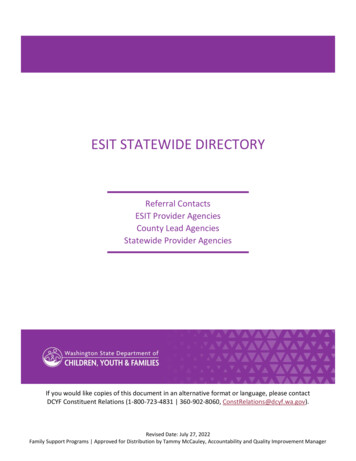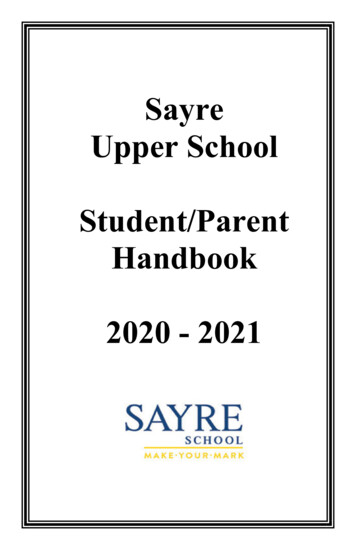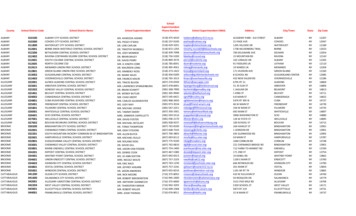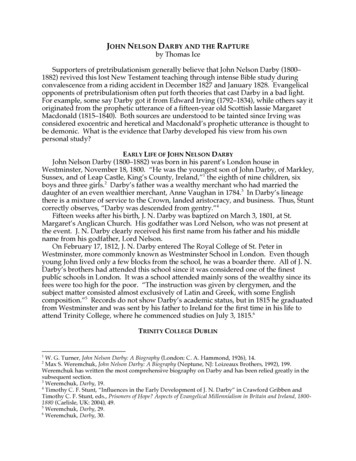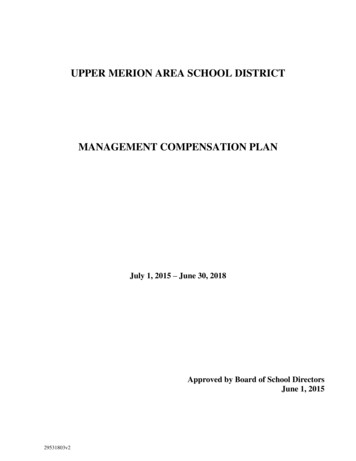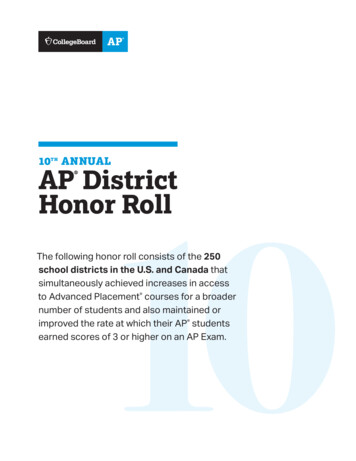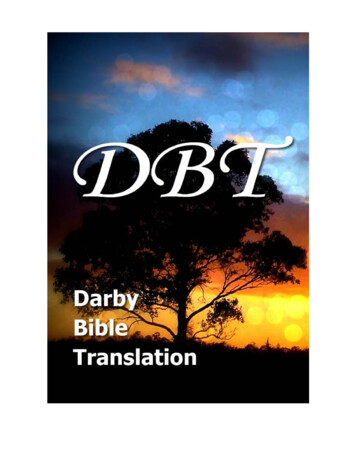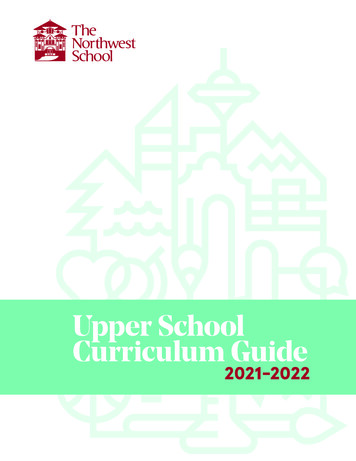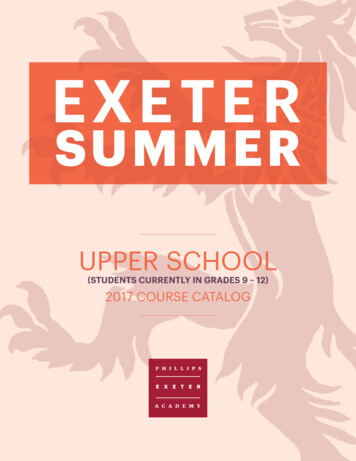
Transcription
UPPER DARBY SCHOOL DISTRICTK-12School Counseling ProgramElementary SchoolsAroniminkBywoodGarrettfordHighland ParkHillcrestCharles KellyPrimosWalter M. SenkowStonehurst HillsWestbrook ParkKindergarten CenterMiddle SchoolsBeverly HillsDrexel HillHigh SchoolUpper Darby
Upper Darby School DistrictK-12 Comprehensive School Counseling . District Profileb. Lists of schools and staffc. Mission Statementd. Core Belief Statementse. Program GoalsEssential Duties and Responsibilitiesa. Communicationb. Consultationc. Coordinationd. Future Planninge. Individual Counselingf. Group Counselingg. Professional Developmenth. Job DescriptionsStakeholders and their Goalsa. Studentsb. Parents/Guardiansc. Teachersd. Administratorse. Counselorsf. Other Staffg. School Boardh. Communityi. Post-Secondary InstitutionsRole of the School Counselora. Leaderb. Advocatec. Collaboratord. Agents of Systemic ChangeProposed Advisory CouncilProgram CalendarProgram DeliveryGuidance Curriculum Action Plana. Academic Supportb. Personal/Social Developmentc. Career/College Planning
UPPER DARBY SCHOOL DISTRICTCommunity Profile 2016-2017Upper Darby Township, a residential suburb of over 85,000 residents, covers 8.3 square milesin Southeast Delaware County, Pennsylvania. In this community of neighborhoods, residentsreflect a great diversity of socioeconomic and ethnic backgrounds. There are over 70 birthcountries and 80 home languages represented by the students of Upper Darby School District.The wide ranges of housing options in the township include apartment complexes, townhouses,duplexes, and single- family homes. The community may be characterized as essentially middleincome with occupational representation at the semi-skilled, technical, and professional levels.Upper Darby School District serves the residents of Upper Darby Township, Clifton HeightsBorough, and Millbourne Borough. Upper Darby is one of the largest school districts inPennsylvania, with approximately 12,000 students and over 960 professional staff and 840support personnel. The district has 14 schools – 1 high school, 2 middle schools, 10 elementaryschools and a Kindergarten Center. The District's mission is to provide “a comprehensive andchallenging educational program which encourages all learners in a safe environment to respectothers, value education, and appreciate and contribute to their community as confident,independent thinkers” (Upper Darby School District, 2017).The School District enrolls over 800 students in its English Language Learner program, 1,300students in its special education programs, and over 100 high school students attend career andtechnical programs in two county-level schools. The District has a budget of over 165 million,with a millage of approximately 33.815 and an average assessment of 100,000.Upper Darby School District has a long and distinguished history in providing public education toits residents. The district was established in 1834 and its first School Board President was Dr.George Smith. According to A History of Upper Darby (1972), Dr. Smith was a “botanist, aneducator, a farmer, a geologist, an historian, a physician, a Judge, a scientist, a senator, andservant of his friends and neighbors.” In 1836, Dr. Smith was Chairman of Pennsylvania’s StateSenate Education Committee and drafted the final version of Pennsylvania’s Free Public SchoolAct. The Act, approved on June 13, 1836, overcame years of opposition to the concept of freeeducation for all children, and authorized state funding for local school districts. For moreinformation about Dr. Smith, please refer to the Upper Darby Historical Society website at:http://www.udhistory.org.Upper Darby School District works closely with the Upper Darby Township, the Upper DarbyTownship and Sellers Memorial Free Public Libraries, the Upper Darby Police Department, theUpper Darby Fire Department, civic and faith-based entities to enhance the quality of life for allstudents, families and residents. In 2010, the District was awarded the Great Place to WorkAward through the Philadelphia Inquirer.
Upper Darby School DistrictK-12School Counseling PersonnelIn the Upper Darby School District, comprehensive school counseling services are provided bythree School Counselors assigned to each middle school and twelve School Counselorsassigned to the high school. In addition, there is a Coordinator of Counseling Services at thehigh school, a part-time Coordinator of Post-Secondary Planning, and a full-time secretary.Developmental Social Work Services are provided in grades K-12; one social worker is in eachof our elementary and middle schools and three are assigned to the high school. Social Workersat the secondary level work in collaboration with the counselors to help provide tier 3social/emotional interventions, provide referrals to, and serve as liaisons with, outside mentalhealth and social service agencies and personnel.Kindergarten and Elementary SchoolsSchool Social WorkerFrancine GibsonMonica StrachanPat MulhollandMarcie MonachelloDena Koser-HannaKim Pleasants-ClarkLaura DolanAnne HenselMichelle CelloMargarita ChristoforidisMargie BatesKindergarten CenterAronimink Elementary, AEDYBywood ElementaryGarrettford ElementaryHighland Park ElementaryHillcrest ElementaryKelly ElementaryPrimos ElementarySenkow Elementary, ELLStonehurst Hills ElementaryWestbrook Park Elementary[KM1]Beverly Hills Middle SchoolSchool CounselorsSchool Social WorkerJane ArchibaldDaniel FisherShelly McDowellRebecca Ruff
Drexel Hill Middle SchoolSchool CounselorsSchool Social WorkerDennis KaysColleen ArnoldMichael MucchettiStacey DoyleUpper Darby High SchoolCoordinator of Counseling ServicesCoordinator of Post-Secondary PlanningSecretary for School CounselingKatherine MertensGisela KleinLeslie BurkeCounselorsSchool Social WorkersFreshman AcademyLisa FlemingMary CannonBeth O’RourkeAmanda Garro (Teams B,E,F)Joanne Christopher (Teams G,C)Tina Johnston (Teams A,D)Class of 2018Steve Bell (A-G)Sharon Donohue (H-O)Latisha Mejias (P-Z)Class of 2017Jill Morris (A-G)Jen Sullenberger (H-O)Jennifer Kim (P-Z)Class of 2019Mike Lavetsky (A-G)Elizabeth Desmond (H-M)Lauren Ambrosine (N-Z)
UDSD SCHOOL COUNSELING PROGRAMMISSION STATEMENTThe Upper Darby School District provides acomprehensive school counseling program that supportsthe academic, social/emotional, personal, and careerdevelopment of all students. The program relies on theeffective collaboration of school, family, and communitystakeholders to empower students to become competentlifelong learners and responsible citizens in a diversecommunity.
UDSD School Counseling ProgramBelief StatementsWe believe: All individuals are capable of learning.Individuals learn in different ways and at different rates.Individuals have the right to be treated with respect and dignity.Students are unique individuals with varied talents and skills.Successful learning experiences build self-esteem.Learning is most effective in a caring and supportive environment where high standardsof social interaction are maintained.Education should encourage individuals to acquire knowledge and attitudes necessaryto live in a changing global society.Critical thinking, problem solving and decision-making are essential life skills.Instructional and other technologies, in addition to improving productivity, should alsofoster communication, collaboration, critical thinking and problem solving, and creativityamong our students, staff, and community learners.Professional development of all staff is vital to meet the changing needs of students andto reflect current best practices.The counseling program must meet the needs of all learners and be responsive to theneeds and resources of the community.The Board is committed to providing school environments and a counseling program thatpromote social and emotional wellbeing as part of the total learning experience forstudents.Cultural and ethnic diversity is a valued strength of our community.Society benefits when individual rights are balanced with the needs of the group as awhole.Lifelong learning is essential for all individuals.Education is the responsibility of the entire community, the school, the family, and, mostimportantly, the individual.
COMMUNICATIONThe Upper Darby School District takes a multi-faceted approach to the communication of itseducational programs, school counseling programs, and opportunities to its students andparents/guardians. Information is disseminated through direct mailings, mass and targetedemails, open house programs, the district web site, cable television, telephone communication,print materials, assemblies, small group meetings, and individual meetings. The secondaryschools also use Naviance, a college and career readiness platform, to communicate withstudents and their families.Communicating Educational Opportunities to Students and Parents/GuardiansClear and effective communication of the high school’s educational programs is critical duringthe transition period from 8th grade to 9th both for retention of students and preparation for highschool. Middle school counselors begin this process in 8th grade through newsletters, teammeetings, and parent conferences. The high school hosts an open house for all prospectivestudents and their parents at each of the respective middle schools. At this meeting,counselors, principals, and faculty present the freshman academy program and explain thedetails of course selection and placement. Eighth grade students and their parents/guardiansare also encouraged to make an appointment to shadow a current student during the springsemester. To further aid the transition to the high school, students and their parents/guardiansare invited to a Freshman Orientation program offered in August prior to their first day of school.The open house program and Freshman Orientation are advertised through directmailings, Naviance family connection messages, global emails, and the district web site.The course selection process is our primary means of communicating the educational programsand opportunities at the high school. The central publication used to communicate ourprograms at the high school is the Course Selection Guide which is provided to every studentupon request and is made available on the district web site. The Course Selection Guide is acomprehensive catalogue with detailed descriptions of all course offerings and information ongraduation requirements, course ability levels, and other matters pertaining to the academicprogram. Information and guidance is provided to students in a number of ways. Schoolcounselors give presentations related to course selection to students in small groups and toparents in an evening program. In addition, teachers discuss with their students the courseofferings in their academic department during class in the week leading up to the day studentscomplete their course selections. Students also attend an “elective fair”, which features studentspeakers and teachers from the different elective courses. For special opportunities, such asvocational school and professional field experience, students are invited to attend meetings tolearn about the offerings and explore their options. Departmental videos on course offerings areshown over our closed circuit television network and can be streamed through the website. Allstudents meet with their school counselor individually to discuss their choices in the context oftheir long-term career and educational goals.
In addition to the vast array of educational opportunities at Upper Darby High School, studentsare encouraged to explore and consider programs and opportunities offered outside of theschool district. Summer enrichment programs offer opportunities to students that not onlyenhance their education but often provide clarity to their career and academic futures. Thecounselors advertise these programs through homeroom notices, announcements, newsletters,targeted emails, and postings on Naviance, our on-line career/post-secondary planningplatform. Through a dual enrollment partnership with the Delaware County Community College,students are also offered opportunities to take college courses while still attending high school.This program is described in print materials and emails, advertised on the school district website, and meetings are held with DCCC staff. The high school has a dual enrollmentrepresentative who visits the school once per week to help students complete the applicationprocess, select their college courses, and transfer their credits into a two or four year college.Upper Darby School District is in the process of creating a School Counseling Advisory Council.The purpose of the School Counseling Advisory Council is to increase communication betweenall stakeholders in the counseling program. The School Counseling Advisory Council includesmembers from the following stakeholder groups: school counselors, school board members,administration, teachers, community members, and parents. The council will meet at least onceper semester (twice per year). The fall meeting will include programming and outcome goals forthe year, and the spring meeting will include a report on the results of those initiatives. Thesemeetings are also an opportunity to solicit feedback from stakeholders on effectiveness ofprogramming and brainstorm ideas for new initiatives.Career Information and AssessmentsThe Career and College Center at Upper Darby High School provides extensive information andresources for career and college exploration, and career assessment tools. The part-timecoordinator of the center is available to assist students and parents with their career and collegeexploration needs. Students are encouraged to visit the career and college center either duringthe school day by obtaining a pass from their counselor, or after school. The center is alsoopen to parents by appointment. All of the resources available in the center are advertised onthe web site.Career assessments are available to students through Naviance. Parents and students aregiven access to the site with their own username and password. The counselors through smallgroup guidance lessons introduce students to the Naviance resources and assign career andcollege exploration tasks for students. There are many useful resources on Naviance to helpstudents discover their interests and strengths that lead to targeted exploration of careers andpost-secondary options. The Naviance tools and resources provide the framework for theindividual counselor sessions engage the student in a discussion of career and educationalgoals.
The Career and College Center hosts career speakers each spring. The speaker series isadvertised through homeroom postings, announcements, newsletters, and the web site.Students request a pass from their counselor to attend career speaker sessions. In addition,the center coordinator teams with the counselors to provide a college and career fair in thegymnasium each spring. The fair targets sophomores and juniors and includes a mix ofrepresentatives from colleges, technical/career schools, and specific trades or industries. Allsophomores and juniors attend during their grade-room, reading class, gifted seminar, or musicclass.Career exploration and assessment is incorporated into the instructional program of the highschool. Teachers are encouraged to incorporate the career exploration tools and videos onNaviance in their classes. Members of our counseling staff present a program during onemonthly faculty meeting encouraging teachers to use the resources available on Naviance intheir classrooms. Teachers have created worksheets to encourage career exploration in theirdiscipline for College & Career week. For example, one science teacher created a STEM careerexploration activity that incorporated Naviance’s “RoadTrip Nation” video series. RoadTripNation features interviews with leaders in a variety of professions, including STEM fields, thecreative arts, education, and business.At the middle school, counselors are preparing to use Naviance to deliver career and collegecounseling. Naviance will be rolled out to students and parents at the middle school in Fall2017. School counselors at the middle school will use developmentally appropriateassessments, career and college information, and goal setting tools tailored to the needs of themiddle school student population. In addition, because the platform is hosted online, parentsand students will be able to access Naviance career exploration and higher education literacymaterials at home, during the summer, or at the public library.
CONSULTATION AND COORDINATION OF SERVICESSchool counselors at the middle school and high school and our K-12 social workers are oftenthe first to identify students who may be experiencing chronic issues that interfere with successin school. A concern about a student may come to the counselor’s attention in a number ofways: through observations, monitoring academic records, parent referral, teacher referral,referral to the SAP team, or communication with outside agencies. Once a problem or concernis identified, the counselor will take the appropriate action to explore the concern and/or initiatethe next step towards coordinating needed services either from within the school or outside ofthe school.Learning SupportWhen a parent, teacher, or student services personnel identify a student who may have alearning disability or other disability that is interfering with the student’s success in theclassroom, a Student Support Team meeting is held. The team determines what interventionscan be provided the student and an intervention plan is implemented. The team may alsodecide to pursue a full psycho-educational evaluation and a “permission to evaluate” is initiated.Behavioral SupportChronic behavioral problems are usually first brought to the school’s attention by classroomteachers. Teachers will refer students to the disciplinarian and seek consultation with theschool counselor. The school counselor will meet with student and possibly mediate aconference between the student and the teacher. The parent/guardian may also be brought infor a conference with the teachers and/or administrator. The school counselor may also makea referral to the school social worker for consultation regarding outside supports. Whentraditional discipline and classroom management techniques are ineffective a referral may bemade to the “planning and placement” committee for consideration of alternative education.Mental Health SupportWhen a parent, teacher, or school counselor identifies a student who may be in need of mentalhealth services, a referral is made to the school social worker who consults with theparent/guardian to coordinate services through outside mental health providersCrises and TraumaStudents who experiences trauma in their life as a result of a crisis such as death of a lovedone, divorce, domestic violence, serious injury, abuse, etc. are in need of support within theschool and often outside services as well. The school counselor will make a referral to theschool social worker for the coordination of services to the student and family.
Substance AbuseWhen there is a concern that a student may be involved with the use and abuse of drugs oralcohol, the student is referred to the Student Assistance Team. The SAP team gathersobjective information from the referral, the teachers, the counselor, and other professionalsinvolved with the student in the school. The team discusses the case and determines whetherto intervene with the student and/or guardians to offer further services.Medical IssuesStudents may experience acute or chronic medical problems that provide barriers to academicsuccess. The counselor’s role is to help coordinate services and communicate with the teachersand other staff as needed. The school counselor also helps coordinate homebound instructionfor students who are unable to attend school because of a medical or psychiatric condition andwill assist with transition back into the school building.
DEVELOPMENTAL SERVICESUpper Darby School District is committed to supporting all students in addressing theiracademic, behavioral, health, personal, and social development needs. The middle school andhigh school counseling programs provide universal school-wide supports to help meet thedevelopmental needs of its students and foster their resilience. The school counseling programis structured to provide consistency and continuity of service to students. In the middle school,one counselor is assigned to each grade level and they move up with their students, allowingthem to develop a long-term relationship with their students and focus on the developmentalneeds of each specific age group. At the high school, three counselors serve the FreshmanAcademy each year, focusing on the transition needs of that cohort. Upon entering the 10thgrade, students are assigned to one of three counselors by alphabet who follow their studentsthrough to graduation.Developmental services are provided by the counseling staff through individual counseling,small group counseling, large group information sessions, consultations, orientations, and thedissemination of information via print materials, emails, phone calls, and web-based platforms.Individual CounselingCounselors meet with students one-on-one to support them in their academic, personal, social,and emotional development. Common areas addressed include: goal setting, problem solving,decision making, conflict resolution, anger management, self awareness, assertiveness, selfexpression, stress management, coping strategies, organizational skills, time management,study skills, course selection, college planning, and career exploration. It is through individualcounseling that counselors develop caring and supportive relationships with their students.Small Group CounselingSmall groups are utilized by counselors to deliver school counseling curriculum, disseminateimportant information, and provide social supports. Small group counseling is utilized in thefollowing areas: orientation program, course selection, self awareness, decision making, careerdevelopment, college planning, college athletics, anger management, student success groups,bereavement, critical incident stress management, and personal growth.Large Group Information SessionsCounselors utilize large group or assembly programs to deliver information and serve the needsof students in a number of ways: career exploration fair, drug and alcohol awareness andprevention programs, date rape awareness, violence prevention, and motivational programs.
ConsultationsCounselors consult with teachers, coaches, and other school personnel to help serve the needsof students. Counselors often help teachers understand the strengths and weaknesses ofstudents and can help with strategies for maximizing their academic success. Counselors canalso provide insight student classroom behavior that may help the teacher effectively meet theiracademic needs.OrientationCounselors participate in a comprehensive orientation program for incoming freshmen. Theprogram provides information and fun activities to help acclimate the students to the highschool, ease their transition, and to provide an opportunity for them to get to know theirteachers, counselors, and classmates. Counselors also conduct an abbreviated orientation fortransfer students in small group and individual formats.Dissemination of InformationThe counseling staff provides written information to support the developmental needs ofstudents in a variety of formats: guides, handbook, flyers, Naviance, and the district web site.This information covers topics such as: Course Selection, Career Development, CollegePlanning, Student Assistance Program, Teenage Pregnancy, and Student Success.
Upper Darby School DistrictThe Counselor’s RoleHow Can a Counselor Help?By Listening· When you lose someone close, make a big mistake, are faced with an important decision,feel confused about drugs, are not getting along with someone special, or feel down withoutknowing why—By Advising· When you are selecting courses, choosing a career, looking for training after high school,trying to find tips for improving your schoolwork—By Interpreting· When you receive scores from tests like the PSAT, SAT, PSSA, Keystone, or when you wantto review your cumulative file—By Informing· When you need facts about graduation requirements, future careers, college admissions, orstudent rights and responsibilities—By Mediating· When you need a third person with an objective view to help you resolve a problem with afriend, teacher, sibling, parent, or employer—By Referring· When you need assistance from an agency in the community, you will be referred to ourschool social worker—When and how can you see a Counselor?Counselors are available before school, after school, and during regular school hours every day.There are also times during the school year where you will see counselors in the classroom, inassemblies, in your grade-room, and at evening programs.What about Confidentiality?What can you say to a counselor in confidence will remain between you and the counselor. Arethere exceptions?Yes. A counselor might decide to talk to someone else about your concern if there seems to bean immediate danger to your life or your welfare or to someone else. Your best bet is to discussconfidentiality with your counselor and establish “ground rules” at the beginning. As counselors,we recognize the value of students, parents, and school staff working together to ensure apositive, effective partnership develops between home and school.
Position Description:Instructional ServicesATitle of Position:Coordinator of Counseling ServicesB.Location of Position:High SchoolC.Accountable to:Principal and Director of Pupil ServicesD.Position Relationship:Line Relationship to Director of Pupil Services andPrincipalE.Code:Major Function:To plan, coordinate and monitor the high school counseling program.To prepare and administer the department budget.To direct the counseling staff in collaboration with the building principals.To prepare an annual evaluation of the counseling program.To coordinate the delivery of district and out-of-district professional developmentopportunities in collaboration with Director of Pupil Services.6. To coordinate the counseling department’s integration of technology into the delivery ofservices.7. To coordinate student records management, including confidentiality requirements.8. To serve on district-wide committees, including the strategic planning committee,representing the counseling program.9. To maintain an awareness of current research, literature and innovations in schoolcounseling.10. To communicate the scope of the services available to families and the community.11. To monitor the district’s standardized testing program.12. To facilitate department meetings and district level counseling program meetingsaccording to a planned schedule.1.2.3.4.5.F.Key Performance Effectiveness Areas:1) Service to Parentsa) To initiate and monitor all forms of communication with parents related to counselingservices.b) To coordinate and monitor small and large group meetings with parents.c) To assess the needs of parents and to coordinate programs to meet those needs.d) To coordinate meetings and communication on course selection and thedevelopment of an informed educational plan.e) To coordinate and monitor programs to inform parents on careers, postsecondaryplanning, scholarships, and financial aid.2) Service to Pupilsa) To coordinate and monitor the delivery of counseling services to students.b) To coordinate and monitor group guidance programs.c) To coordinate and monitor the Advanced Placement testing program.d) To coordinate the school crisis team in collaboration with the principal.e) To coordinate and facilitate the course selection process.
f)To coordinate and monitor scheduling and rostering in collaboration with theassistant principal for operations.g) To monitor the maintenance of student records.h) To monitor the services provided by the Student Assistance Team.i) To monitor the services provided by the Career and College Center.3) Service to Teachers and Staffa) To communicate to teachers and staff the counseling services provided to students.b) To communicate to teachers and staff current information related to barriers toeducation.c) To coordinate with school social workers referrals for outside support.d) To monitor the Multidisciplinary Team process.e) To coordinate consultative services related to the personal, social, and academicneeds of students.f) To communicate information, guidelines and procedures in the event of a crisis incollaboration with the principal.4) Service to the Communitya) To communicate to the community information related to counseling programs andservices.5) To assume any duties assigned by the Director of Pupil Services or Principal.G.Performance Standards for Position:To coordinate and monitor individual and group counseling, consultation with parents and staff,and specific guidance programs thus enabling each student to meet his/her educational goals.H.Areas of Authority:Staff Position. Resource person to Counselors, Principal, Assistant Principals,Psychologists, Home and School Visitors, Teachers, Nurses,Attendance Officer.I.Minimum Requirements:Master’s degree in School Counseling from an accredited institution of higher education.Pennsylvania certification as a secondary school counselor.A minimum of five years experience in the field of school counseling.J.Working Conditions/Physical Environment:The Coordinator of Counseling Services works inside a climate-controlled facility for 100%of day.K.Physical Demands/Sensory Abilities:This position is classified as sedentary in nature as defined by the U
Upper Darby School District serves the residents of Upper Darby Township, Clifton Heights Borough, and Millbourne Borough. Upper Darby is one of the largest school districts in Pennsylvania, with approximately 12,000 students and over 960 professional staff and 840 support personnel. The district has 14 schools - 1 high school, 2 middle .

